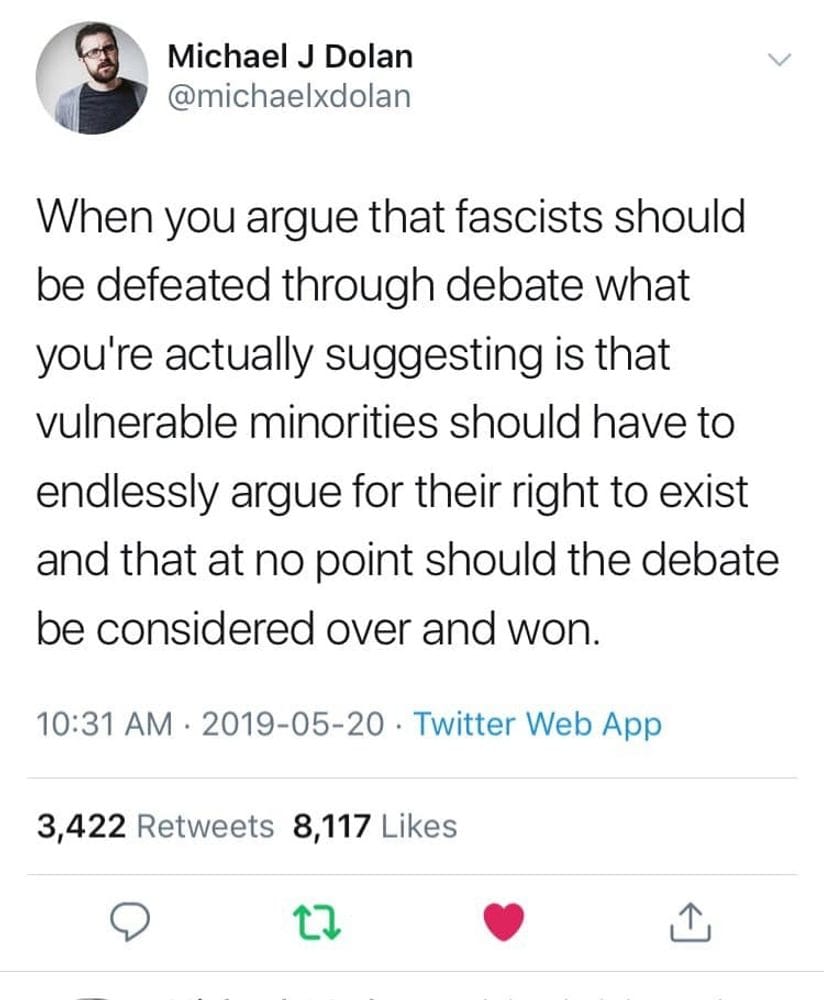Citation Needed has a new home
Citation Needed is no longer hosted on Substack. Welcome to my antifascist bar.

Notice things look a little different around here? You're looking at citationneeded.news (or at an email from the same), which is the new home of the Citation Needed newsletter. You can jump to the TL;DR to learn what this means for you.
As I wrote in my last newsletter, Substack decided to respond to the open letter and growing chorus of Substackers calling for them to remove blatant Nazia content by saying "no thanks, we'll keep them" in a disingenuous and frankly rather insulting Substack note. In it, Substack co-founder Hamish McKenzie wrote that Substack has decided they will host Nazis because that allows their hateful ideas to be "subject[ed] to open discourse", as though Nazi ideologies only remain to this day because people simply haven't argued enough about them.
My decision to leave Substack was not one I made lightly. There have been a lot of discussions around this from various writers trying to decide what to do, and a lot of the arguments are compelling, including:
- "This is my livelihood and I can't take the risk of incinerating my source of income overnight"
- "Migrating can be incredibly challenging and time-consuming"
- "It's more impactful to stay on Substack and loudly advocate for change"
- "It's more impactful to wait until a large group of writers can coordinate a mass exodus"
- "Why should we be the ones who have to leave, and not the Nazis?"
- "It feels like the number of platforms that actually have a reasonable stance on content moderation is approaching zero, is Substack really worse?"
and so on.
All of these were compelling, to varying degrees. After all, in a more just world, it would be the Nazis who just spent sixty hours migrating their newsletters to self-hosted solutions devoid of the kind of network effects and promotion that Substack offers. And where do I draw the line between which platforms I will and won't use, when so many platforms seem to be just varying degrees of awful?
In the end, though, the decision was pretty clear: it was time to move on from Substack. I wasn't going to spend so much time and energy on my writing just to have to try to ignore that a rather large cut of the money I make here goes towards a company that thinks Nazi "discourse" is more important than the very real harms of providing these people a platform and revenue.

If I'm going to spend such a large amount of my time and energy on writing, I'm going to do it in a place where I feel comfortable, and where my readers and supporters feel comfortable. You've heard the Nazi bar analogy by now, so I won't repeat it, but I really liked Ben Werdmuller's living room analogy:
Think of the web as a series of living rooms. If you’re in my living room, I have the right to kick you out if you start being abusive to me or other people in the room. I get to set the rules in my space so that other people can feel safe to be there. Different people have different values, so their living rooms might have different rules. But I get to set mine.
I also get to decide which rooms I want to be in, and which rooms I want to invite other people into. I don’t have any interest in hanging out in a room with Nazis, and I certainly don’t have any interest in inviting my friends to hang out there with me. If I find that the owner of the living room allows people who make me or my friends feel unsafe — or, as is true in [Substack's] case, pays them to hang out there, and makes money from their presence — I can use the law of two feet to leave.
Instead of trying to comb through the multitude of blogging platforms and newsletter providers out there, I have instead decided that I will be a platform of one. This way, I don't have to worry that a platform will — as with Substack — fail to enforce content moderation policies that I thought should have protected against this. It also gives me a lot more ownership and control over the work that I do, which is something I've been wanting for a while.
Welcome to my antifascist living room.
I will go into the nitty-gritty of the migration very soon, in part because I know a lot of other writers are looking to others who have migrated for information and advice on how to do so themselves. I don't expect my choice will be a feasible one for a lot of people, but I do hope it will help inform others' decisions.
For now, since I know some people are curious: I am self-hosting an instance of the open source blogging platform Ghost, to which I have made some modifications. Payments are, as they were with Substack, powered by Stripe, which is why I was able to move all my subscribers over without everyone needing to resubscribe. Substack no longer takes a 10% cut of all subscriptions (which was on top of the more reasonable Stripe fees, which remain unchanged after the migration). Migration was performed using an incredibly disappointing Substack export, Ghost's custom code that tries to make up for it, and some custom code of my own to fill in the remaining gaps. Email sending is coming through Mailgun, with some custom code to wire up the kinds of transactional emails I think are important but that Ghost hasn't incorporated (yet?). The Ghost instance and a webhook server I put together are being hosted by DigitalOcean, which has been my trusty VPS provider for over a decade now.
As for the questions you might have about what happens for your subscriptions, here is the...
TL;DR
At the end of the day, there should be no noticeable difference for you, besides the (hopefully improved) aesthetics. If you were already subscribed, you should be able to click the "Sign in" button in the top right, enter the email you used previously, and receive a magic link to sign in here. Note that you do not need to sign up again if you were already subscribed!
You should have received this email in your inbox, although there may be some delays for some email providers as they get used to this new domain sending a lot of email (which can sets off spam red-alerts).
For paying subscribers, your subscriptions are still active and, as with before, you should have access to the comments section as a result. If you want to manage your subscription, change your preferences, change your subscription tier, or anything else, you should be able to do that by clicking the "Account" button.
For anyone who doesn't already subscribe, you can sign up for a free or paid subscription at the shiny new sign-up page, which is about 50% less janky than the weird discount code thing I had to do back at Substack. There is still a little jank for those of you who are already paying subscribers but who want to change your subscription tiers — you will see quite a dizzying array of options instead of my nice little sign-up dropdowns, at least until I get more time to fiddle with it. It all should work, though, which is the important part.
One last important thing: if you notice anything that seems wrong or have any questions, please contact me. If you received this post in your inbox, you can just reply to the email; otherwise, shoot a message to molly@mollywhite.net or newsletter@citationneeded.news, leave a comment, pull out the semaphore flags and find a tall mountain, or avail yourself of any of my other contact options. It's really not a bother if you reach out, I promise. I really want to make sure there are no surprises or hiccups during this process.
Thank you all for your support and patience as I've been working on this. It's irritating that this has demanded so much of my time, and I'm mad that that cool thing I've been teasing for ages now has been back-burnered while I deal with all this, but I do think this change is both important and for the best.
Until next time,
– Molly White
Footnotes
I had several public and private replies to my last newsletter along the lines of "these days people will call anyone a Nazi!" To be very clear, we're talking about Substacks that are using swastikas, sonnenrads, and photos of Hitler in their branding, and publishing screeds about "white genocide" and other things I'd frankly rather not reprint. There are certainly conversations that can be had about content moderation and the difficulty of defining exactly where to draw the line between acceptable and unacceptable content, but the Substacks identified in the open letter and in The Atlantic piece were nowhere close to any reasonable line.




